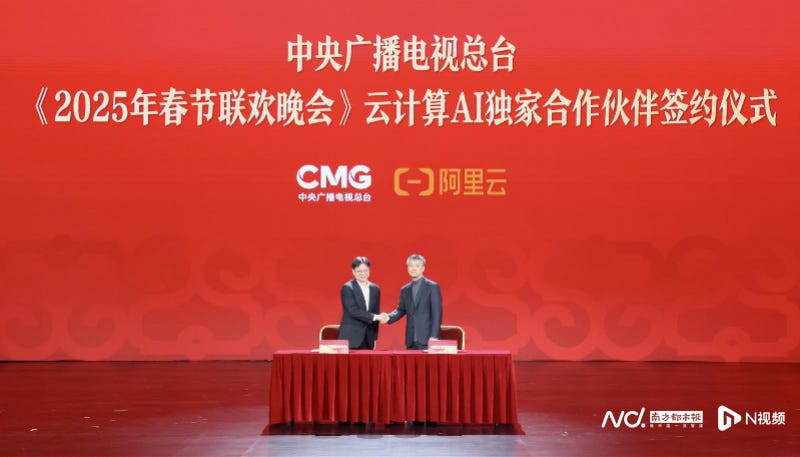A few things on my radar #9
DeepSeek; Alibaba ; Nike
🧨Happy Chinese New Year! Thanks for reading The Momentum. Subscribe for free to receive new posts and support my work!
DeepSeek
DeepSeek, a Chinese AI model, shows domestic small teams can still innovate—even without overseas talent or massive resources amid tech restrictions

Chinese AI lab DeepSeek has surprised Silicon Valley by creating AI models that rival US leaders while using cheaper, less powerful hardware. The company released an open-source language model for under $6 million using Nvidia H800 chips, challenging assumptions about AI development costs and America's tech leadership, said CNBC.
Despite US export controls on advanced chips limiting Chinese AI companies, DeepSeek's success shows these restrictions may backfire. According to MIT Review, the sanctions are instead pushing startups to develop more efficient solutions through innovation and collaboration.
Tech giants like Alibaba and ByteDance, as well as a handful of startups with deep-pocketed investors, dominate the Chinese AI space, making it challenging for small or medium-sized enterprises to compete. A company like DeepSeek, which has no plans to raise funds, is rare.
Following its viral R1 AI chatbot that's topping app charts and waving the stock market, DeepSeek has launched Janus-Pro today, a new open-source image AI model claiming to surpass OpenAI's DALL-E 3.
Liang Wenfeng, the founder of Deep Seek, told 36Kr in an interview last year: “For the past thirty years, we (Chinese companies) have only emphasized making money while neglecting innovation. (However) Innovation isn't purely driven by business - it also requires curiosity and creativity. We've just been constrained by past inertia, but this is only a phase…what we lack in innovation is certainly not capital, but rather confidence and knowing how to organize high-density talent to achieve effective innovation.“
While most companies aim to recruit top 50 talent from overseas, Liang's team has no one from the global top, and not even any overseas returnees, yet he believes his team can cultivate their own world-class top talents.
What impresses me most is not just DeepSeek's products, but their talent and organizational culture behind them.
The DeepSeek team comprises young, talented geeks from major Chinese universities who work in a bottom-up organizational structure that values creativity over seniority. This work-culture startup stands in sharp contrast to traditional Chinese management, which prioritizes hierarchical authority over talent.
DeepSeek's success offers a powerful model for both domestic companies pursuing innovation and investors seeking the next Chinese unicorn. It demonstrates that China still has the capability to disruptive innovate, and such innovation in China can still emerge from unexpected teams, not outdated established giants—just like what Bytedance once did
It's so Silicon Valley vibe, isn't it? —a group of unknown science geeks, united by an outsider in an obscure place, accomplished something crazy — even the Chinese themselves could hardly believe this just happened at first glance.
Alibaba
Alibaba will appear as a core sponsor in the 2025 Spring Festival Gala show
Alibaba signed a deal with China Media Group (CMG) , a media organization controlled by CCP, to be the exclusive e-commerce and cloud computing / AI partner for the 2025 Spring Festival Gala show on state broadcaster China Central Television, according to CMG's December 2024 statement.
The TV show, which airs on January 28, has been a Lunar New Year’s Eve tradition for millions of Chinese families since it started in 1983.
The new partnership with CMG signals an improving relationship between Alibaba and Beijing, following the market regulator's decision in August to conclude its three-year antitrust review of the company, said SCMP.
In October 2021, at the Bund Summit, Jack Ma criticized banks' "pawnshop mentality" in their lending practices. This angered officials, leading to his questioning by authorities on November 2. Subsequently, Alibaba underwent a three-year regulatory "rectification" process after receiving an antitrust fine for monopolistic practices, and many subsidiaries that had planned to go public terminated their IPO plans.
The Chinese New Year Gala is China's most-watched annual television event—comparable to the Super Bowl in the United States. Brands featured in the show gain unmatched exposure, with even greater single-day impact than Singles' Day Shopping Festival campaign.
Alibaba, as the key sponsored brand, will definitely gain significant visibly, which could directly lead to increased sales to their e-commerce business.
Besides, this collaboration clearly shows that Alibaba's relationship with the CCP has not just slightly improved, but has undergone a dramatic transformation as the CCP has begun to publicly endorse Alibaba's business.
After tonight, we no longer need to guess where Jack Ma is.
Nike
Nike's CNY commercial campaign 'Year of the Mamba' has sparked controversy in China
Nike's CNY commercial campaign 'Year of the Mamba' has sparked controversy in China
Nike launches its "Year of the Mamba" campaign honoring Kobe Bryant with a "Have a Hard Year" commercial. The ad celebrates Kobe's "Mamba Mentality" of resilience and excellence, connecting it to the Chinese New Year of the Snake through themes of determination and grit. The campaign ends with the slogan "It's not the Year of the Snake, it's the Year of the Mamba."
The ads resonated with a core group of viewers - Kobe's fans. Many fans have been moved by the story - "I was brought to tears watching his commercial," said a comment online. Some of them even spontaneously came to take photos at the offline ad posters, remembering this great athlete.
However, this commercial also sparks controversy in social media as some believe the slogan ” It's not the Year of the Snake” shows disregard for Chinese traditional culture. "Making money in China while disrespecting our Year of the Snake??" someone complained.
Nike's "Year of the Mamba" commercial strikes a powerful chord in China through its use of Kobe's legacy to inspire determination, but walks a fine line with its cultural messaging. The campaign risks pushing away increasingly self-assured Chinese consumers who value their cultural heritage. Though its authentic portrayal of perseverance resonates across cultures, replacing traditional zodiac symbols with a Western sports icon may draw criticism for cultural insensitivity.





Agreed re Nike. I feel like a more respectful variant would have been much better. Perhaps “make this Year of the Snake your Year of the Mamba”?
Re the articles, Kobe is intriguing but DeepSeek seems like a more consequential story for China’s future creative power, and the world’s. The background and operational mentality at DeepSeek is helpful to know.
Nike’s latest reminds me a little of their ‘Winning isn’t for everyone’ ad from the Paris Olympics.
Not bad in terms of broad concept, just misses on execution so you end up with mixed emotions.